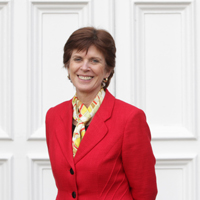
They are the most powerful and influential people in Scotland.
The 100 names cut across all fields including politics, art, religion and literature and exercise their power in all kinds of ways.
Here is the sixth group, numbers 51-60. To see the other groups, please click on the links below.
Scotland's Power100 1-10
Scotland's Power100 11-20
Scotland's Power100 21-30
Scotland's Power100 31-40
Scotland's Power100 41-50
Scotland's Power100 61-70
Scotland's Power100 71-80
Scotland's Power100 81-90
Scotland's Power100 91-100

51 Kath Mainland
As chief executive of the Edinburgh Festival Fringe since 2009, 45-year-old Mainland is in charge of the biggest arts festival in the world, and as such has a crucial role in how Scotland is seen outside Scotland.
Not a programmer, she has no direct artistic involvement in the festival, but she constantly showcases the Fringe abroad and is impressive when she does.
Unlikely to say: Anything which implies that "commercial" is a dirty word. Her philosophy is that art venues have to make money.

52 Alistair Carmichael
A former lawyer from hill-farming stock in the Western Isles, the MP for Orkney and Shetland was brought in as Scottish Secretary by Nick Clegg a year before the referendum to do a specific job: to put some stick about.
And he did, although Nicola Sturgeon was generally considered the winner in their head-to-head debate.
As Scottish Secretary, Carmichael, 49, remains in a job that has an importance and relevance in Westminster it has not had since the 1990s.
Most likely to say: "Up Helly Aa."

53 Professor Muffy Calder
At a time when male computer science students still outnumber females by nine to one, Professor Calder is a champion for science in general but computer science in particular.
After a 25-year career as an academic at Glasgow University, culminating in her appointment as professor of computing science, the 56-year-old is now Chief Scientific Adviser for Scotland. It is her job to provide independent advice and champion science as a driver to economic success.
Most likely to say: "Let me show you how that works."

54 Peter Lawwell
As chief executive of Celtic, the pre-eminent football club in Scotland, Lawwell, 55, is probably the most powerful man in the Scottish game.
He has considerable influence in the corridors of the Scottish Football Association, and that influence extends to Europe as a member of the European Club Association. The club agreed to introduce a living wage for staff last week but Lawwell condemned the role of politicians in the campaign to do so.
Least likely to say: "Spend, spend, spend."

55 Ben Thomson
Thomson, a banker, set up centre-right think tank Reform Scotland in 2008. It proposed what is known as Devo Plus, the idea the Scottish Parliament should be responsible for raising the majority of what it spends.
Earlier this month, Thomson, 51, launched the cross-party Campaign For Scottish Home Rule aimed at ensuring the Smith Commission settlement is based on principles rather than political deals. Chairman of Scottish-based merchant bank Inverleith LLP, he is a force to be reckoned with in Scottish public life.
Watch out for: Plain-talking if he is unhappy with the Smith Commission settlement.

56 Alan Rennie
One of Scotland's most influential media figures, Rennie, 54, has been working on and with Scottish newspapers for 35 years, starting out in 1979 on titles such as the Bishopbriggs Times and Clydebank Post.
He is now head of Trinity Mirror newspapers in Scotland, including the Daily Record, Sunday Mail (which he edited from 2000 to 2009) and 17 local papers, and their websites.
He was previously editor-in-chief of the group's Scottish titles.
Least likely to say: "This internet craze will blow over."

57 Professor Louise Richardson
The redoubtable Irish-born principal of St Andrews University is a world authority on terrorism and highly respected as an academic and administrator. St Andrews ranked fourth in the UK in this year's Complete University Guide.
Richardson, 56, St Andrews' first female principal, is willing to speak her mind, having highlighted risks to university research funding she foresaw from independence. Criticism of the university for being elitist has led to a rise in students from deprived areas on her watch, though there is still some way to go.
Watch out for: Richardson on the first tee at the Royal & Ancient.

58 Neil Murray
The man who has ensured the National Theatre of Scotland (NTS) has become since its founding in 2006 such a prestigious company with a worldwide profile through touring, Murray is an acclaimed theatre producer who was previously director of the Tron Theatre in Glasgow.
He became executive producer of NTS in 2005, ensuring it attracted the cream of Scottish producing talent. Among his achievements has been the promotion of the phenomenally successful 2006 play Black Watch, by Gregory Burke, which has been performed worldwide and won four Olivier awards and a Herald Angel.
Watch out for: David Greig's play Dunsinane touring the USA in 2015.

59 Amanda McMillan
The managing director of Glasgow airport since 2008, McMillan, the 45-year-old is one of the country's highest-profile businesswomen. The airport supports over 7,300 jobs including its supply chain and the business challenges in running it are multi-faceted, made more so during McMillan's tenure by the economic downturn.
This summer the airport recorded its highest passenger numbers in six years and is set to be boosted by the transfer of some Ryanair services from Prestwick. McMillan, a mother of two, is a chartered accountant by training.
Watch out for: More routes and more passengers.

60 Gordon Matheson
Matheson is one of Scotland's most successful Labour politicians, at a time when the party's star is on the wane, having been one of the figureheads of Glasgow's widely feted Commonwealth Games earlier this year.
He returned as council leader in 2012 after Labour confounded predictions by vanquishing the SNP, and has since negotiated for Glasgow the first City Deal north of the Border, worth £1.3 billion. He has at times been controversial but his big achievement has been to steady the council after previous leader Stephen Purcell's much-publicised departure.
Least likely to say: "Edinburgh's slightly superior."


Why are you making commenting on The Herald only available to subscribers?
It should have been a safe space for informed debate, somewhere for readers to discuss issues around the biggest stories of the day, but all too often the below the line comments on most websites have become bogged down by off-topic discussions and abuse.
heraldscotland.com is tackling this problem by allowing only subscribers to comment.
We are doing this to improve the experience for our loyal readers and we believe it will reduce the ability of trolls and troublemakers, who occasionally find their way onto our site, to abuse our journalists and readers. We also hope it will help the comments section fulfil its promise as a part of Scotland's conversation with itself.
We are lucky at The Herald. We are read by an informed, educated readership who can add their knowledge and insights to our stories.
That is invaluable.
We are making the subscriber-only change to support our valued readers, who tell us they don't want the site cluttered up with irrelevant comments, untruths and abuse.
In the past, the journalist’s job was to collect and distribute information to the audience. Technology means that readers can shape a discussion. We look forward to hearing from you on heraldscotland.com
Comments & Moderation
Readers’ comments: You are personally liable for the content of any comments you upload to this website, so please act responsibly. We do not pre-moderate or monitor readers’ comments appearing on our websites, but we do post-moderate in response to complaints we receive or otherwise when a potential problem comes to our attention. You can make a complaint by using the ‘report this post’ link . We may then apply our discretion under the user terms to amend or delete comments.
Post moderation is undertaken full-time 9am-6pm on weekdays, and on a part-time basis outwith those hours.
Read the rules hereComments are closed on this article